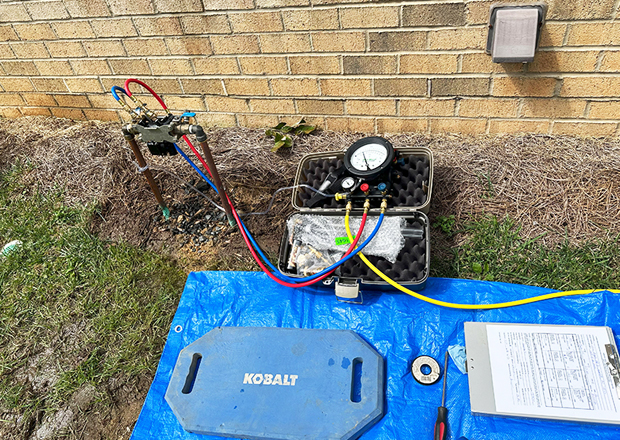Backflow Testing Services
Do you know the Cross Connection Ordinance requires all commercial, industrial, and residential customers connected to the County’s water system with an irrigation meter (or irrigation system that uses their single residential meter) to install and maintain a backflow prevention device? These devices help protect the public water supply from contamination, if backflow occurs. The backflow prevention device must be tested annually to ensure it is kept in working condition. A violator may face $100-1500 per day per violation.

The County requires that all commercial and industrial water customers have backflow prevention devices on their basic water service as well as their irrigation systems and fire lines. Residential customers with irrigation systems must have backflow protection.
Backflow prevention assemblies protect the public water system from contamination in case of a backpressure or backsiphonage issue. Backflow devices prevent water from flowing back into the public water supply from the customer’s service line, protecting against possible contaminations of the public water system.
The backflow device should be installed within 10′ of the meter when possible. In some cases, the device may be installed at a greater distance from the meter if obstacles prevent installation within 10′ (commercial or industrial properties only).
Union County Water customers are responsible for scheduling the installation, testing, or repair, as well as the cost.
Union County Water customers must contact an approved, certified tester for testing of their device. Customers are encouraged to call more than one tester because their prices vary. Commercial and industrial customers must have a backflow prevention device installed by a licensed plumber and tested by a certified tester after installation. Residential irrigation customers may install their own backflow prevention device if they choose to do so and submit exempt licensure paperwork. Residential irrigation customers must have their device tested by a certified tester after installation.
The backflow prevention device must be tested after installation, after every repair, and after a device has been relocated. The devices are required to be tested annually after all of previously mentioned situations, and as long as the device is installed at the property. (Residential customers are required to test their devices biennially).
Testing and inspection ensures that the required backflow preventer is kept in working condition. Mechanical backflow preventers are an assembly with springs and moving parts. Over time with continuous wear, these assemblies will fail or need parts replaced. When an assembly fails, it is no longer effective in preventing backflow from occurring.


